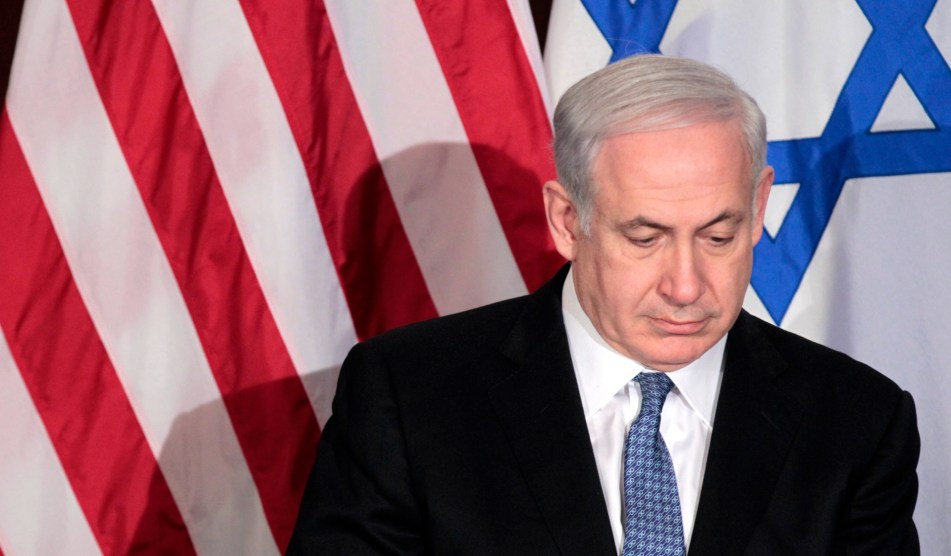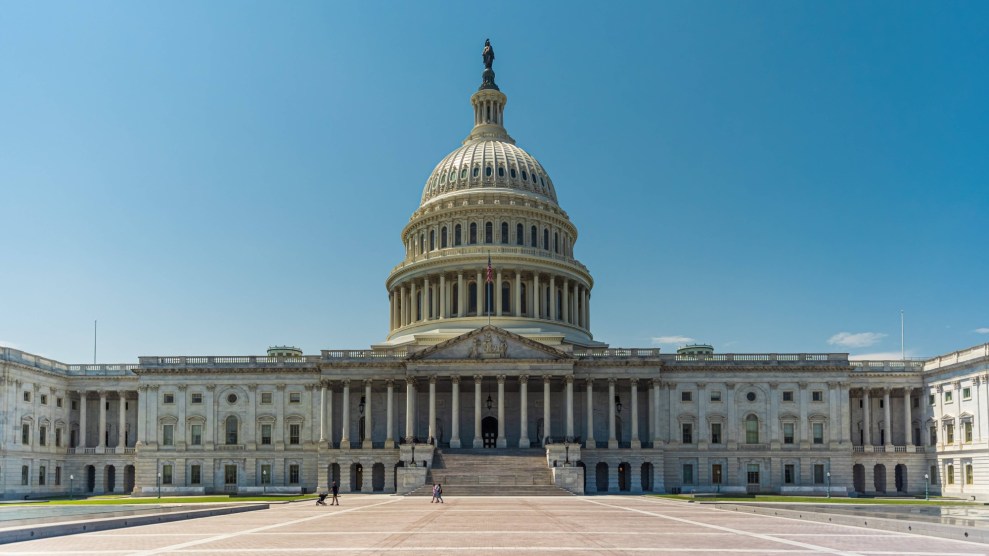
Maurice Mitchell is the national director of the Working Families PartyMother Jones; Courtesy Maurice Mitchell
Last November, the American Israel Public Affairs Committee (AIPAC), the most powerful pro-Israel lobbying group in Washington, announced a $100 million effort to unseat members of Congress who vocally supported calls for a ceasefire in Israel’s war on Gaza. AIPAC and its allies have flooded the spring and summer primaries of Cori Bush, Jamaal Bowman, and Ilhan Omar, and Summer Lee with pro-Israel opponents, limitless spending, and inflammatory rhetoric.
Last night, Lee, the first Black woman elected to Congress from Pennsylvania, won her reelection campaign handily, fending off a challenge from a local councilwoman who accused Lee of “stoking antisemitism” and sought to mobilize support from local Jewish leaders. As it stands, it looks like AIPAC’s war chest has run into a formidable opponent: Maurice Mitchell, national director for the Working Families Party.
Mitchell began his career in progressive New York state politics and became one of the founding leaders of the Movement for Black Lives. He mobilized many of the same groups that, under WFP’s banner, elected the majority of the Squad back in 2018, including Justice Democrats, Sunrise Movement, and the Democratic Socialists of America. Alongside groups like the US Campaign for Palestinian Rights and Jewish Voice for Peace, they formed Reject AIPAC, a coalition seeking to challenge AIPAC’s power by calling on Democrats to reject the group’s endorsements and contributions. WFP is steering this work as a third party by supporting candidates running in Democratic primaries and the general election. This year they’ve endorsed almost 300 candidates running in 24 states and will likely back hundreds more by the end of the 2024 cycle.
It’s quite a glow up for a left-leaning coalition of labor unions and grassroots groups that united in the aftermath of Bill Clinton’s rightward shift and attacks on welfare. Twenty-five years later, the Working Families Party is one of the most powerful third parties in the country, steering the progressive wing of the Democratic Party and defending its most powerful players. And they’re not stopping at building momentum for progressive candidates. They’re taking on one of the largest and longest-standing pillars of Washington politics: the pro-Israel lobby.
We spoke with Maurice Mitchell, national director of the Working Families Party, about defending the Squad, the growing strength of the ceasefire movement, and the role of third parties in the 2024 election season. Our conversation has been edited and condensed.
What are the Working Families Party’s top priorities in this current election cycle?
We have a strategy called Block and Build. We have two priorities over the next two years: to block authoritarianism and build the independent infrastructure for our movement. Just a few days ago we made thousands of calls to voters in the Pittsburgh area on behalf of Summer Lee because the right wing is using AIPAC as a vehicle to funnel millions into Democratic primaries to defeat progressives, specifically Black progressives. When you look at the list, it’s Summer Lee, Cori Bush, Jamaal Bowman, Ilhan Omar. There’s a trend here. And, on top of their identities, they are the ones taking risks to align with where the majority of people are. Most Democrats believe aid to Israel should have strings attached to it and that we should be using everything in our power to manifest an immediate ceasefire in Gaza. That’s not a controversial position within the Democratic Party. It’s only a controversial position with elites in Capitol Hill. Why? Because so much of this right-wing money is being funneled into threatening and bribing politicians to take positions that aren’t popular.
What has been WFP’s role in organizing for a ceasefire in Gaza? Do you see the political calculus changing for Democrats?
We’ve done a number of things. Defending elected officials who came out very early for a ceasefire is one. But we’re also going on the offensive against AIPAC. We, along with Justice Democrats and a number of other organizations, launched the Reject AIPAC coalition because we need to tell the true story about what this organization is. AIPAIC masquerades as a pro-Israel organization or a group primarily concerned with foreign policy, but it’s actually a tool for the right wing and corporate interests to launder their money in order to attack progressives.
AIPAC is a perfect example of the corruption in Capitol Hill. In one breath, they claim some sort of moral high ground around challenging antisemitism and in the other they endorse dozens of ultra-right-wing insurrections who are either aligned, adjacent to, or straight up white supremacists. Any elected official that claims to be serious about democracy cannot continue to take AIPAC’s money or endorsement.
But we’re also working to build support for Cori Bush’s resolution calling for a ceasefire. The current number is up to 85 members in the House and Senate. In October, it was very risky for elected officials to even mention the word “ceasefire.” Now Nancy Pelosi, who just months ago was calling out [ceasefire] activists as potential agents of China, is on a resolution that is expressing a desire to condition aid to Israel. The Vice President has called for a ceasefire. The president in the last readout of his conversation with Netanyahu mentioned that he wanted to see an immediate ceasefire. Initially, establishment Democrats saw the ceasefire movement as a political problem to be managed or handled, but now—especially with the numbers coming out of the uncommitted effort—they’re realizing this movement is a serious constituency that they only ignore at their peril.
We’re in the middle of a presidential election season with two unpopular choices and a lot of frustration with the two-party system. There’s a lot of interest but also hostility toward third parties. What do you think third parties like WFP can contribute to this moment?
I’m happy that the idea of third parties is being popularized this cycle. Each third party has its own strategy and I think people should be curious and serious about what that strategy is and what that party’s path to victory is. What we’re seeking to do is to build a third party from the ground up.
Historically, there have been a lot of third-party efforts to build it from the top down, meaning you start off with a charismatic presidential candidate like Ross Perot and you build your party around them. We’re doing the exact opposite. Our approach is you build it county by county, city by city, and state by state. This is a long-term project. That’s the only way we’re going to be able to actually subvert the two-party system.
What does that look like in practice?
We believe that you cook with what you have in the kitchen, so that means we tailor our strategy to the state we’re working in. In states, where there is electoral fusion like New York, Connecticut, and Oregon, we are legally and fiscally an independent party. We have our own ballot line. Electoral fusion allows third parties to cross endorse candidates of other parties. It’s the answer to the spoiler dilemma.
In states where we don’t have fusion, we do a number of things. For example, in Philly, there are set asides for the “minority party” on the municipal level. Historically, that’s meant every election Republicans have basically gotten two seats just for signing up and filling out the paperwork. No other party challenged the Republicans to be the second party of Philly until we came along. We reasoned that there were more working families and progressive voters in a city like Philly so we ran independent Working Families Party candidates. In the at-large city council race last cycle, we won one of those seats. This cycle, we won the other. And now Philly is a two-party city: Democrats and Working Families Party.
Efforts to criminalize and restrict protest are growing alongside calls for a ceasefire in Gaza. How are you thinking about those two dynamics in the runup to the election?
It’s not surprising that people in power seek to shrink or deny the space for grassroots movements to express themselves. We’re not too far away from the 1960s when young people at Kent State were killed by the National Guard. In the Black Power and civil rights movement many people died. This is just the latest iteration of that.
Just look at the recent Supreme Court decision that would in effect outlaw certain types of protests in Texas and other states. It’s both a threat to democracy and free speech. But it also speaks to how powerful we are. They wouldn’t seek to do these things if we were as marginal as they try to convince us we are.
What are the plans for the summer with the conventions around the corner?
It’s easy to sit and watch the news and look at the two people at the top of the ticket and feel cynical about our options. To me, that means we’re putting a bunch of DC-based political strategists and people who don’t have our interests at heart in the driver’s seat. This election and the stakes are not about individual politicians, it’s about us. It’s about our communities, our families, and the things that are sacred to us. We want to make it clear to folks that how we vote—but more importantly—how we organize before and after the election will have a huge impact on how our children are educated, whether they can access books about their history, or whether their identities are banned. Or whether we have a federal government that’s pouring more fuel on the fire of repressive policing. And really getting people to wrestle with what these choices mean for them versus “let’s give Joe another shot” or “let me tell you a story about how bad Donald Trump is!”
All those things may or may not be true, but the thing that will ultimately be true is that these decisions are going to affect the people we care about and we need to put that front and center. We need to lead with our community as the main protagonist, not elected officials.

















